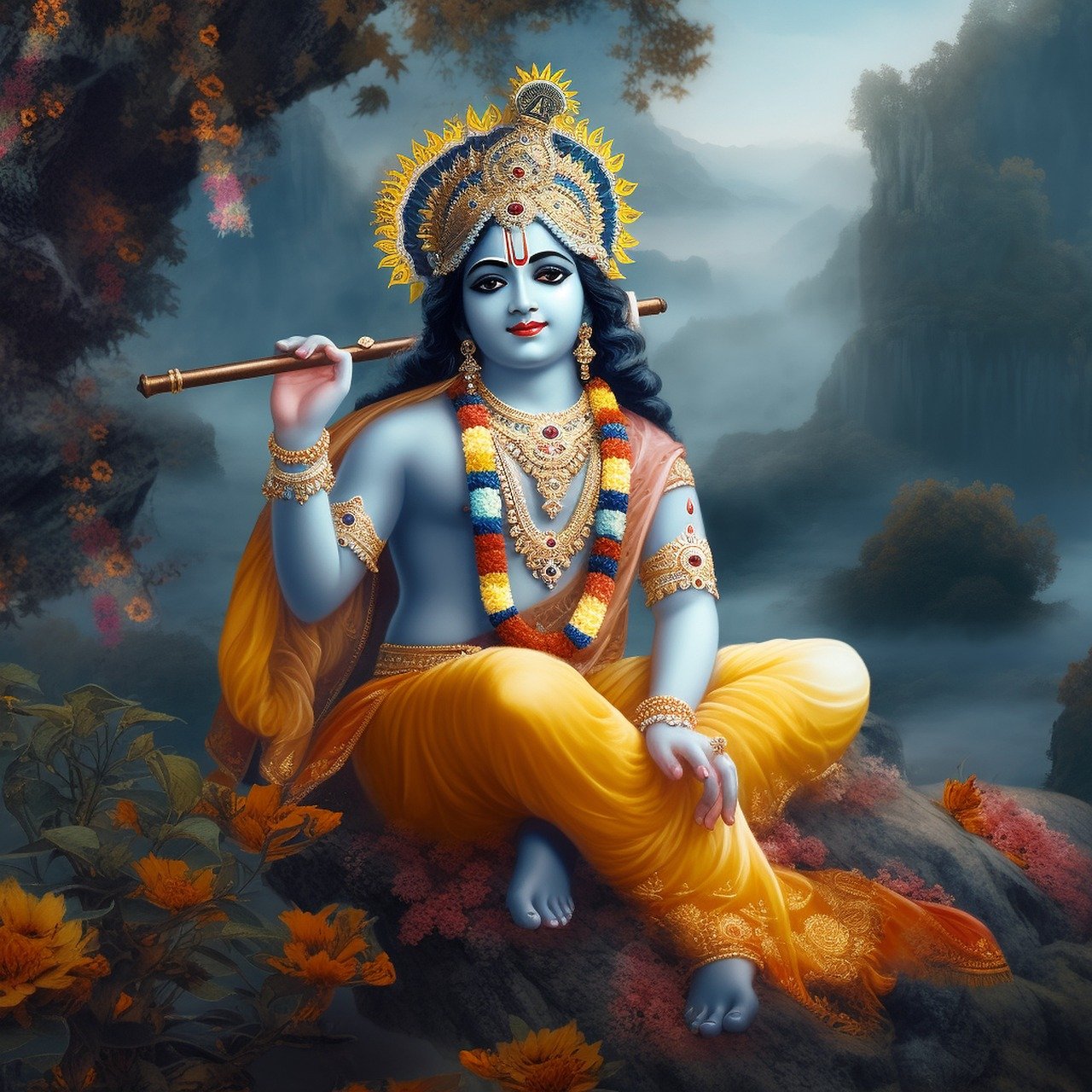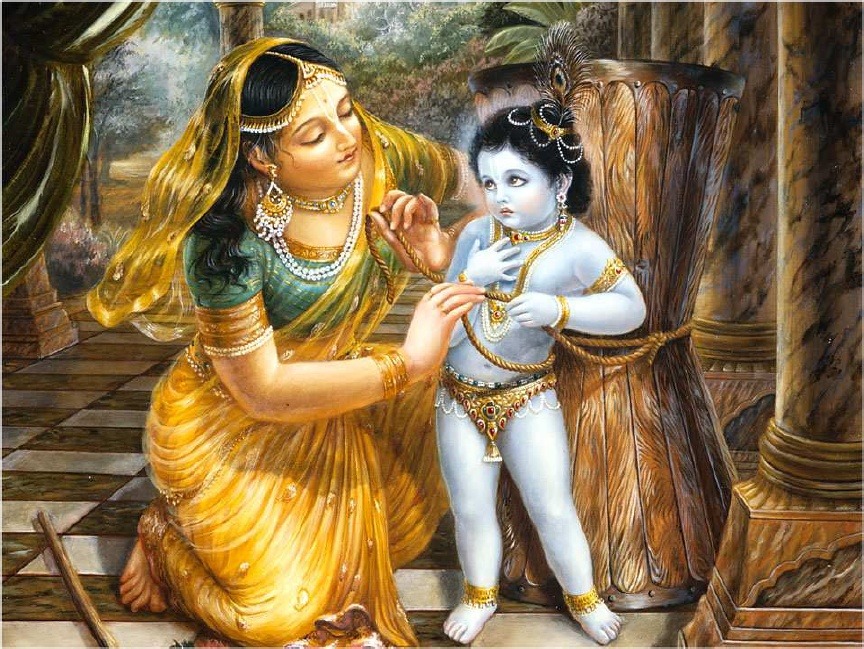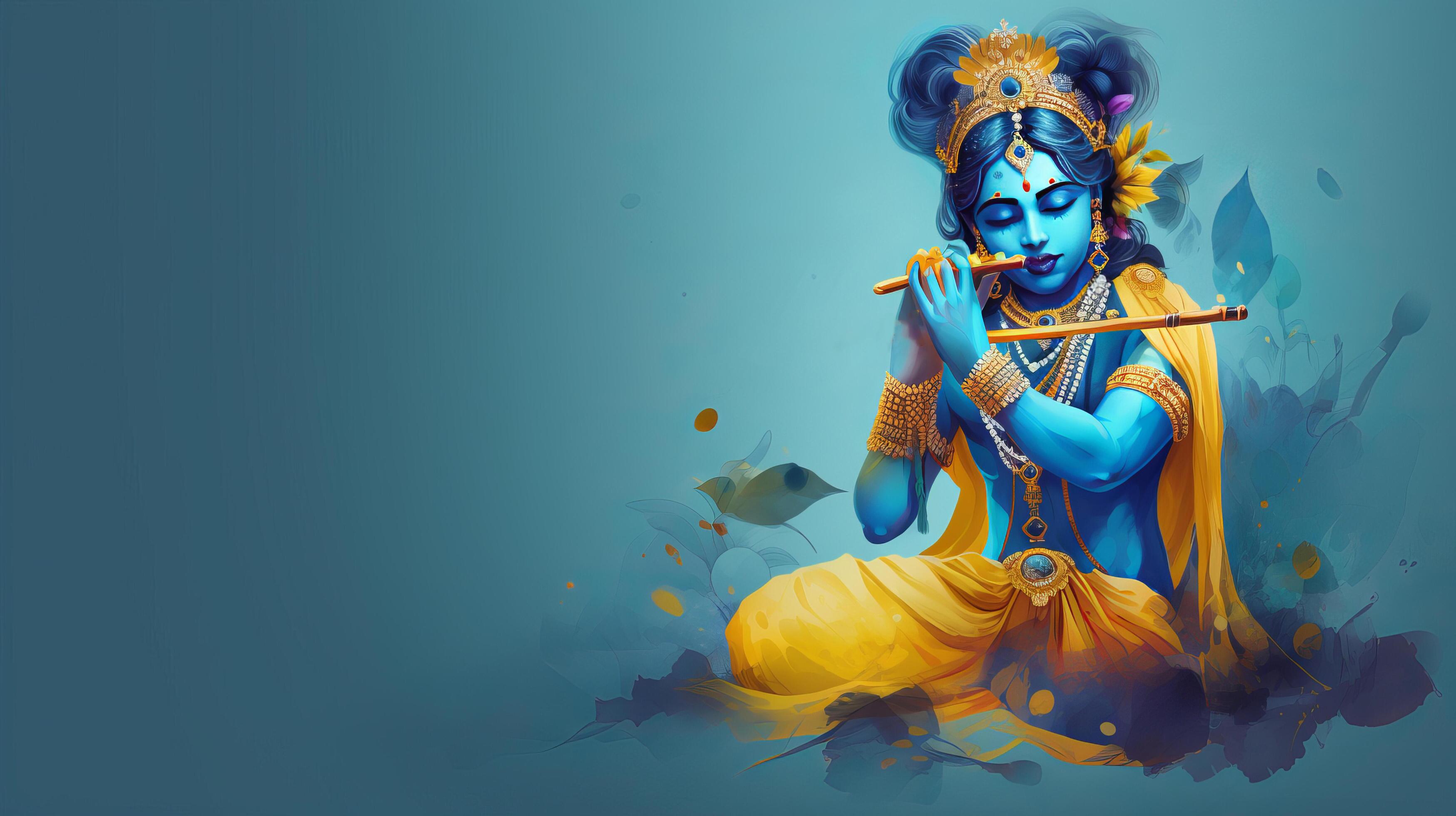About Lord Krishna

Lord Krishna, a revered figure in Hindu mythology, is a divine incarnation known for his multifaceted persona and profound teachings. Believed to be the eighth avatar of Lord Vishnu, he is celebrated as a deity of love, wisdom, and guidance. Krishna's life, as chronicled in ancient scriptures like the Bhagavad Gita and Mahabharata, showcases his roles as a charismatic leader, a playful young cowherd, and a spiritual mentor. His timeless stories and philosophical insights inspire millions, transcending cultural and geographical boundaries.
Who is lord krishna?

Lord Krishna is a prominent deity in Hinduism and is considered the eighth avatar (incarnation) of Lord Vishnu, who is one of the principal gods in the Hindu pantheon. Krishna is a central figure in Indian mythology and is revered for his multifaceted roles and teachings.
Krishna is often depicted as a divine hero, a compassionate lover, a charismatic leader, and a wise philosopher. He is most famously known for his role in the epic narrative, the Mahabharata, where he serves as a guide and charioteer to the warrior Arjuna in the Bhagavad Gita, a sacred scripture that contains profound spiritual teachings and philosophical insights.
Krishna's childhood stories, his enchanting flute-playing, and his youthful adventures as a cowherd in the village of Vrindavan have captured the hearts of devotees for generations. His teachings emphasize the importance of duty, righteousness, and devotion while encouraging individuals to embrace their responsibilities and pursue a path of spiritual growth.
Krishna's life and teachings have had a profound impact on Indian culture, spirituality, and philosophy, and his influence extends beyond Hinduism to various other spiritual traditions and artistic expressions around the world.
What is special about Krishna?
Lord Krishna is revered for several unique qualities and attributes that set him apart as a special and divine figure in Hindu mythology:
Divine Incarnation: Krishna is believed to be the eighth avatar of Lord Vishnu, incarnating on Earth to restore balance and righteousness whenever they are threatened.
Multifaceted Personality: Krishna's persona encompasses various roles, including a mischievous child, a charismatic youth, a devoted friend, a wise philosopher, a fearless warrior, and a divine lover.
Philosophical Teachings: One of the most significant contributions of Krishna is his discourse to Arjuna in the Bhagavad Gita, where he imparts profound spiritual teachings, addresses ethical dilemmas, and emphasizes the paths of devotion, knowledge, and selfless action.
Flute-playing and Cowherd Pastime: Krishna's enchanting flute-playing and his joyful interactions with cows and cowherd companions in Vrindavan symbolize his ability to captivate hearts through divine music and foster a harmonious connection with nature.
Divine Love and Devotion: Krishna's relationship with Radha, his divine consort, symbolizes the highest form of spiritual and romantic love. Their love stories and devotion to each other are celebrated for their deeper spiritual significance.
Miracles and Divine Feats: Krishna is known for performing miraculous deeds, such as lifting the Govardhan hill on his finger to protect his devotees from a storm and displaying his universal form (Vishvarupa) to Arjuna, revealing his cosmic nature.
Universal Appeal: Krishna's teachings and stories transcend cultural boundaries and are appreciated for their universal themes of morality, duty, love, and spirituality.
Cultural Impact: Krishna's influence extends to various art forms, literature, music, dance, and celebrations in Indian culture. His stories have inspired countless poets, artists, and philosophers throughout history.
Symbolism: Krishna is often depicted as having blue skin, symbolizing his connection to the divine. His peacock feather-adorned crown represents his connection to nature and his divine authority.
Role in Epics: Krishna plays a pivotal role in the Mahabharata, guiding Arjuna on the path of righteousness and duty. His involvement in key events of the epic showcases his strategic prowess and leadership skills.
These qualities collectively make Lord Krishna a unique and revered figure, whose influence continues to inspire and guide people on their spiritual journeys and in their pursuit of a righteous and meaningful life.
What is Lord Krishna's full name?

Lord Krishna's full name in English is "Krishna Vasudeva." He is a prominent figure in Hinduism and is considered one of its most revered deities. Krishna's life and teachings are elaborated upon in various Hindu scriptures, including the Bhagavad Gita, where he imparts profound spiritual wisdom to the warrior Arjuna. His name "Krishna" signifies his dark or blue complexion, while "Vasudeva" is a reference to his father, Vasudeva, indicating his lineage as the son of Vasudeva and Devaki.
Krishna is a multifaceted divine being known for his role as a protector, teacher, and guide. He is often depicted playing the flute and is associated with divine love, compassion, and mischievous charm. His life is filled with extraordinary episodes, including his childhood escapades, heroic feats, and his pivotal role in the Mahabharata, an ancient Indian epic.
Throughout history, Krishna has been a source of inspiration for countless devotees, poets, artists, and philosophers, making him an enduring and beloved figure in Hindu mythology and spirituality.
The main message of Krishna
The main message of Lord Krishna, as conveyed in the Bhagavad Gita, is to encourage individuals to fulfill their duties and responsibilities (dharma) with unwavering devotion and selflessness. He emphasizes the importance of selfless action and devotion to the divine, irrespective of the outcomes or rewards. Krishna also teaches the significance of finding inner peace, balance, and spiritual realization through meditation and a deep connection with the Supreme Being. Overall, his message revolves around living a righteous and spiritually enlightened life while maintaining a strong connection with the divine.
The real story of Krishna
The story of Lord Krishna is a prominent narrative in Hindu mythology and religious texts. While it encompasses a wide range of events and teachings, here is a brief overview of the key aspects of the real story of Krishna:
Birth: Krishna was born in the city of Mathura to Queen Devaki and King Vasudeva. His birth was extraordinary, as it took place in a prison cell, and he miraculously survived several attempts on his life by his maternal uncle, the tyrant King Kamsa.
Childhood: Krishna spent his early years in Vrindavan, where he is known for his playful and mischievous nature. He became renowned for his divine pranks and love for playing the flute. His childhood is filled with stories of his miraculous feats, including defeating demons and lifting the Govardhan Hill to protect the residents of Vrindavan from a rainstorm sent by Lord Indra.
The Mahabharata: Krishna played a pivotal role in the Mahabharata, an epic battle between two groups of cousins, the Pandavas and the Kauravas. He served as the charioteer and advisor to Arjuna, one of the Pandava princes, and delivered the Bhagavad Gita, a sacred discourse on life, duty, and spirituality, on the battlefield of Kurukshetra.
Ras Leela: Krishna is also famous for his divine love and devotion, particularly with his consort Radha. Their love story is celebrated in the form of "Ras Leela," where Krishna and Radha engage in ecstatic and spiritual dance and romance.
Death: Krishna's earthly journey concluded when he was accidentally struck by an arrow and left his mortal body. He returned to his divine form.
Legacy: Lord Krishna's teachings and stories continue to be a significant part of Hinduism. He is revered as a deity who represents love, compassion, wisdom, and divine playfulness. His life and teachings are documented in various scriptures, with the Bhagavad Gita being one of the most important texts associated with him.
The real story of Krishna is a blend of myth, legend, and spiritual teachings, and he remains a beloved and revered figure in Hinduism, inspiring countless devotees and followers throughout history.
Why is Krishna blue?

Krishna is often depicted as blue in Hindu art and iconography for several symbolic and cultural reasons:
Divine Color: The blue complexion of Krishna is believed to represent his divine and transcendental nature. It is a way of expressing that he is not bound by the limitations of the mortal world but exists in a higher, spiritual realm.
Cosmic Symbolism: Blue is associated with the infinite expanse of the sky and the boundless cosmic reality. By portraying Krishna as blue, artists symbolize his connection to the cosmic and universal aspects of existence.
Spiritual Depth: The color blue is often linked to depth, mystery, and the profound. It signifies the depth of Krishna's character, wisdom, and spiritual significance.
The Ocean of Love: In the devotional context, Krishna's blue color is seen as a reflection of the deep ocean of love and devotion that he inspires in his devotees. It represents the vastness of his love and the boundless devotion of his followers.
Romantic Symbolism: In the context of his relationship with Radha and the Gopis (cowherd girls) in Vrindavan, Krishna's blue skin is sometimes associated with the color of a rain-filled cloud. This connection adds a romantic and poetic element to his image.
Tradition and Artistic Representation: Over centuries, artists and poets have depicted Krishna as blue, and this tradition has become deeply ingrained in Hindu culture and spirituality. It's now the standard way of portraying him.
It's important to note that the color blue in Krishna's depiction is more symbolic than literal, emphasizing his divine and spiritual attributes rather than his physical appearance.
The 4 special qualities of Krishna
Lord Krishna is often celebrated for his unique and special qualities in Hindu mythology and spirituality. Four of his most notable qualities are:
Divine Love and Compassion: Krishna is known for his boundless love and compassion. He teaches that love for God (bhakti) is the most direct path to spiritual realization. His divine love is especially evident in his interactions with his devotees, such as his deep connection with Radha and the Gopis in Vrindavan.
Supreme Wisdom and Knowledge: Krishna imparts profound spiritual wisdom in the Bhagavad Gita, where he serves as the charioteer and guide to Arjuna on the battlefield of Kurukshetra. His teachings encompass various aspects of life, duty (dharma), and the path to spiritual enlightenment.
Divine Playfulness: Krishna's mischievous and playful nature is a unique aspect of his character. His childhood antics, such as stealing butter and playing pranks, endear him to devotees and emphasize the idea that the divine can be both transcendent and accessible.
Protector and Savior: Krishna is seen as a protector and savior of his devotees. He intervened in various situations to save his followers from danger, as seen in his role during the Mahabharata, where he supported the Pandavas and guided them to victory.
These qualities, along with many others, have made Lord Krishna a beloved and revered figure in Hinduism, drawing millions of devotees who find inspiration and spiritual guidance in his teachings and life story.
When was Krishna born and where?
Lord Krishna is believed to have been born in the city of Mathura, which is located in the northern part of India, in the state of Uttar Pradesh. His birth date is traditionally celebrated on the eighth day of the waning moon in the month of Bhadrapada, which usually falls in August or September of the Gregorian calendar. This auspicious day is known as "Krishna Janmashtami" and marks the birth of Lord Krishna. The exact historical date of his birth is a subject of debate, but Krishna Janmashtami is widely observed by Hindus as his birthday.
What is Krishna Favourite food?
In Hindu mythology and folklore, Lord Krishna is often associated with a fondness for various foods, with one of his most famous favorites being "makhan" or "butter." He is affectionately referred to as "Makhan Chor" or "Butter Thief" because of his childhood antics of stealing butter from the homes of the Gopis (cowherd women) in Vrindavan.
Krishna's love for butter is symbolic of the sweetness and joy he brings to his devotees' lives. He is also said to enjoy other dairy products like yogurt and milk.
Additionally, Krishna's association with the flute and melodious music signifies his appreciation for the arts, including music and dance.
It's important to note that these references are primarily symbolic and part of the rich storytelling and mythology surrounding Lord Krishna rather than literal dietary preferences.
Conclusion:
In conclusion, Lord Krishna holds a profound and enduring place in Hindu mythology, spirituality, and cultural heritage. His life, teachings, and divine qualities continue to inspire millions of devotees worldwide.
Krishna's message, as conveyed in the Bhagavad Gita, emphasizes the path of selfless action, devotion, and spiritual realization. He symbolizes the boundless love, wisdom, and compassion that resonate deeply with his followers.
His playful and mischievous nature, his profound wisdom, and his role as a protector and guide make him a multifaceted deity who is both relatable and awe-inspiring.
Krishna's life, from his miraculous birth in Mathura to his divine escapades in Vrindavan and his pivotal role in the Mahabharata, is a testament to his significance in the Hindu pantheon.
His blue complexion, associated with divinity and transcendence, adds to the mystique of his character, while his love for butter and melodious flute-playing evoke a sense of joy and sweetness.
Lord Krishna's legacy extends beyond religion and touches the realms of philosophy, art, music, and literature. His timeless teachings and enchanting stories continue to captivate hearts, reminding humanity of the eternal truths he embodies: love, wisdom, devotion, and the pursuit of righteousness.
As devotees across the ages have found solace and inspiration in Lord Krishna, his enduring influence remains an integral part of the tapestry of Hinduism and the broader cultural landscape.


